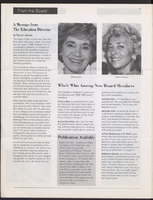Search the Special Collections and Archives Portal
Search Results
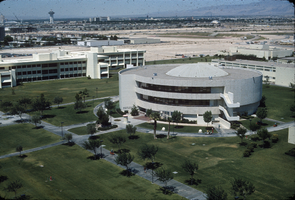
Slide of University of Nevada, Las Vegas, circa 1970s
Date
Archival Collection
Description
Image
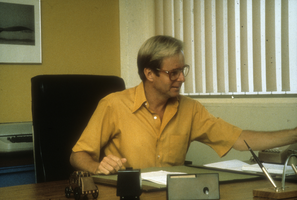
Slide of Richard Kunkel, circa 1970s
Date
Archival Collection
Description
Image
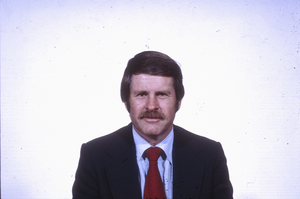
Slide of Dwight W. Marshall, circa 1970s
Date
Archival Collection
Description
Image
Ruby Gordon oral history interview
Identifier
Abstract
Oral history interview with Ruby Gordon conducted by Claytee D. White on October 29, 2004 for the African Americans in Las Vegas: a Collaborative Oral History Project. In this interview, Gordon talks about her birth and early upbringing in Pine Bluff, Arkansas and Las Vegas, Nevada, where her parents moved when she was seven years old. She discusses her parent's decision to move for better opportunities and the kind of work they did, then speaks extensively about her education through high school, her early marriage, and raising six children. She also talks about the difficulties that mothers faced while trying to work and raise children, especially those with health issues. Later she talks about her involvement with the Elks fraternal organization and explains that there were different lodges for whites and Blacks, based primarily on location, the lodges regularly interacted and worked together on civic and charity programs. Finally, she expands on her own work history in early childhood education, working for the state, and for Child Haven.
Archival Collection
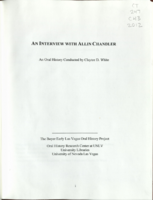
Transcript of interview with Allin Chandler by Claytee White, February 5, 2013
Date
Archival Collection
Description
Another member of Rancho High School's first graduating class of 1962, Allin Chandler charted a course that took him from school football to a distinguished career as a teacher, principal, and Executive Director for the Clark County Association of School Administrators. Allin moved to Las Vegas from Texarkana, Texas with his mother in 1958, joining his father who was serving in the Air Force and stationed at Nellis AFB. Starting 9th grade at J.D. Smith Junior High and continuing on to Rancho the following year. Still actively involved in school athletics, Allin quickly discovered his talent and love for maths and science and eventually earned his degree in math and education. The stories Allin shares in this interview paint a vivid picture of how an intelligent and motivated young man can succeed - and how the class-free world of Las Vegas in the 1950s and 60s offered opportunities that he would never have had in class-conscious world of the South.
Text
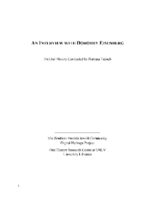
Transcript of interview with Dorothy Eisenberg by Barbara Tabach, October 23, 2014
Date
Archival Collection
Description
Interview with Dorothy Eisenberg by Barbara Tabach on October 23, 2014. In this interview, Eisenberg discusses her upbringing on the east coast and becoming a widow with four children. She met her second husband at a synagogue, and they moved to Las Vegas for a fresh start. Eisenberg became involved with Temple Beth Sholom, and the Las Vegas League of Women Voters. She has a school named after her in the Clark County School District.
Dorothy Eisenberg is a first generation American, with roots in Ukraine and Central Europe, and grew up in Philadelphia. Judaism was a significant part of Dorothy's life from the beginning, and both her and her brother spent many of their afternoons at Hebrew school and most weekends at Shabbat services as adolescents. Eisenberg moved to Las Vegas with her children and second husband in 1964. She became an influential member of the community and served as the Jewish Federation of Las Vegas's first female president. She was also actively involved in the League of Women Voters of Las Vegas Valley, including leading the organization's advocacy for school desegregation and serving as its president for two years.
Text
Luella Wardle oral history interview
Identifier
Abstract
Oral history interview with Luella Wardle conducted by Elizabeth Nelson Patrick on August 04, 1981 and August 05, 1981 for the Ralph Roske Oral History Project on Early Las Vegas. In this interview, Wardle discusses living in Tonopah, Nevada since 1907 and describes the living conditions at the time. Wardle also discusses education and the school system, recreational activities, and her employment in banking. She then describes Tonopah during World War II and explains how the army base was beneficial for businesses. Wardle goes on to explain where the families of the soldiers would stay while stationed in Tonopah. Lastly, Wardle discusses organizations she was a member of, the significance of fraternal organizations to Southern Nevada, and Tonopah during prohibition.
Archival Collection
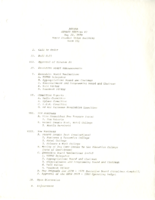
Meeting minutes for Consolidated Student Senate, University of Nevada, Las Vegas, May 22, 1979
Date
Archival Collection
Description
Text

Photograph of Marica Washington, 2007
Date
Archival Collection
Description
Color portrait photograph of Marcia Washington as President of the Nevada State Board of Education, January 2007.
Image

